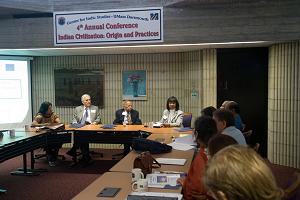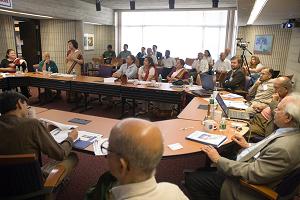Contribute
| Scientists Collide With Linguists To Assert Indigenous Origin Of Indian Civilization |
Press Release
07/12/2006
Comprehensive population genetics data along with archeological and
astronomical evidence presented at the conferenceon June 23-25, 2006 in
Dartmouth, MA, overwhelmingly concluded that Indian civilization and
its human population is indigenous.
In fact, the
original people and culture within the Indian Subcontinent may even be
a likely pool for the genetic, linguistic, and cultural origin of the
most rest of the world, particularly Europe and Asia.
Leading evidences come from population genetics, which were presented
by two leading researchers in the field, Dr. V. K. Kashyap, National
Institute of Biologicals, India, and Dr. Peter Underhill of Stanford
University in California. Their results generally contradict the notion
Aryan invasion/migration theory for the origin of Indian civilization.
Underhill concluded "the spatial frequency distributions of both L1
frequency and variance levels show a spreading pattern emanating from
India," referring to a Y chromosome marker. He, however, put several
caveats before interpreting genetic data, including "Y-ancestry may not
always reflect the ancestry of the rest of the genome."
Dr.
Kashyap, on the other hand, with the most comprehensive set of genetic
data was quite emphatic in his assertion that there is "no clear
genetic evidence for an intrusion of Indo-Aryan people into India,
[and] establishment of caste system and gene flow."
Michael Witzel, a Harvard linguist, who is known to lead the idea of
Aryan invasion/migration/influx theory in more recent times, continued
to question genetic evidence on the basis that it does not provide the
time resolution to explain events that may have been involved in Aryan
presence in India.
Dr. Kashyap's reply was that even
though the time resolution needs further work, the fact that there are
clear and distinct differences in the gene pools of Indian population
and those of Central Asian and European groups, the evidence
nevertheless negates any Aryan invasion or migration into Indian
Subcontinent.
Witzel though refused to present his
own data and evidence for his theories despite being invited to do so
was nevertheless present in the conference and raised many questions.
Some of his commentaries questioning the credibility of scholars evoked
sharp responses from other participants.
Rig Veda has
been dated to 1,500 BC by those who use linguistics to claim its origin
Aryans coming out of Central Asia and Europe. Archaeologist B.B. Lal
and scientist and historian N.S. Rajaram disagreed with the position of
linguists, in particular Witzel who claimed literary and linguistic
evidence for the non-Indian origin of the Vedic civilization.
Dr. Narahari Achar, a physicist from University of Memphis clearly
showed with astronomical analysis that the Mahabharata war in 3,067 BC,
thus poking a major hole in the outside Aryan origin of Vedic people.
Interestingly, Witzel stated, for the first time to many in the
audience, that he and his colleagues no longer subscribe to Aryan
invasion theory.
Dr. Bal Ram Singh, Director, Center
for Indic Studies at UMass Dartmouth, which organized the conference
was appalled at the level of visceral feelings Witzel holds against
some of the scholars in the field, but felt satisfied with the overall
outcome of the conference.
"I am glad to see people
who have been scholarly shooting at each other for about a decade are
finally in one room, this is progress," said Singh.
The conference was able to bring together in one room for the first
time experts from genetics, archeology, physics, linguistics,
anthropology, history, and philosophy. A proceedings of the conference
is expected to come out soon, detailing various arguments on the origin
of Indian civilization.
You may also access this article through our web-site http://www.lokvani.com/

Dr. Rajaratnam of Sri Lanka, Dr. Nicholas Kazanas of Greece, Dr. B. B. Lal of India, and Dr. Marcellette Williams, Senior Vice President of University of Massachusetts System.

